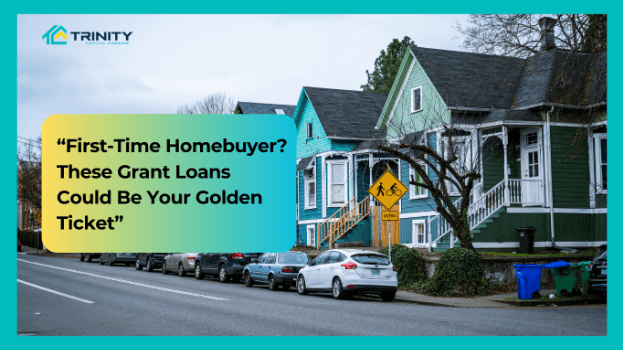First-Time Homebuyer? These Grant Loans Could Be Your Golden Ticket
Purchasing your first home can be challenging, especially when it comes to down payments and closing costs. Thankfully, first-time homebuyers in 2025 can benefit from grant loans that reduce financial pressure. These grants, which don't require repayment, are a valuable resource for low- to moderate-income families looking to enter the housing market with confidence.

Purchasing your first home may seem like a struggle, particularly in terms of a down payment and closing expenses. Fortunately, your first year of homeownership is supported by numerous grant loans that will cut down on the financial pressure and enable first-time buyers to confidently move into their new homes in 2025. This type of grant offers monetary resources that could not be paid back; thus, it becomes a valuable asset that low- to moderate-income families could use to venture into the housing market.
These may include federal programs such as the Homeownership Set-Aside Program (HSP) and state and local grants, among others, and one can avail oneself of financial opportunities. Best of all, even if you do not qualify as a first-time buyer, some grants are based on income and location restrictions. Learning about them and how you can qualify, and how they work alongside current mortgage rates in Oregon can be the way to immense savings and being able to afford the house of your dreams.
How First-Time Homebuyer Grants Work
First-time homebuyer grants are monies that are given by governmental bodies, non-profits, and in certain instances, lenders in order to cover down payments, closing costs, and even repairs. There is no repayment of such grants, as there is in the case of loans, thus they are an outright saving in terms of the money you require at the outset. Most income-limited programs require incomes to be at or below Area Median Income (AMI), but some simply require a household to have an income below 150 percent of AMI, making them a valuable resource for an Oregon first time home buyer seeking financial assistance.
Buyers are usually required to occupy the home as their learning foundation, and in some cases, they are required to take a homebuyer education class. Grants also come with limits to the purchase price and a personal contribution that must be made to the purchase. It is also important to apply early since there are limited funds which are given on a first serve basis.
What You Should Know About Popular Grant Programs
Homeownership Set-Aside Program (HSP)
Provides grants between $2,500–$15,000.
For first-time buyers earning up to 80% of the Area Median Income (AMI). Using a house sale calculator can help buyers estimate costs and see how these grants could lower their overall expenses.
Homeownership Possibilities Expanded (HOPE) Scheme
Offers forgivable grants up to $12,500.
Available to buyers meeting specific income criteria.
State and Local Programs
Provide grants or forgivable loans in varying amounts.
Have differing eligibility requirements.
Often require homebuyer education and counseling.
Mortgage Credit Certificate (MCC) Program
A federal tax credit program.
Reduces the overall cost of homeownership.
Downpayment Toward Equity Act(proposed legislation)
Would provide grants up to $25,000.
Aimed at individuals who have never owned a home.
What Grant Loans Mean for You
No Payback: Grants are not repaid, and this lowers early expenses.
Down Payment and Closing Costs assistance: Can assist in overcoming the savings hurdle to obtain a mortgage.
Income-Based Eligibility: Works to help low- and moderate-income purchasers.
Homebuyer Education: All this involves taking courses to equip buyers as a requirement of many programs.
Forgivable Loans: Other grants turn to loan forgiveness against a specific term of a home ownership time frame.
Broad Reach: Provided by federal, state, local, and non-profit organizations.
Frequently Asked Questions (FAQs)
What is a first-time homebuyer grant?
A grant is an amount of money provided to the purchasers to support down payment and closing charges that need not be refunded.
Who qualifies for these grants?
Normally, first-time buyers who earn less to moderate income and who satisfy the limits to enter the low- and medium-income bracket in the purchase price and income.
Do I have to pay back a grant?
No, a grant is not a loan and usually should not be paid back.
What are the common requirements to get a grant?
Primary residence occupancy, income restrictions, buyer education, and in some cases, a non-refundable down payment by the buyer.
How much money can I get from a grant?
The amounts are different, but commonly they can be between 2500 and 15000, or more, depending on the program.
How do I apply for a first-time homebuyer grant?
Contact local housing agencies, lenders, or nonprofits with grant programs to offer and take any courses of mandatory education needed.
Conclusion
The first-time homebuyer grants are an effective instrument to make houses more reachable and less expensive. These programs make buying a house easier and can be less stressful as the financial obstacles of down payment and closing costs are lowered when using them. Being aware of the number of grants that exist and satisfying their eligibility criteria is one of the ways that enhance your chances of obtaining such assistance.
The 2025 development of grant programs should focus on starting the research and communication with lenders and housing counselors as early as possible to maximize the benefits. The ability to own a home base becomes a real dream come true, provided you make the right plans and preparations.
Ready to make your dream home a reality?
Explore your grant options and secure the best path to homeownership today. VisitTrinity Capital Funding to get started.